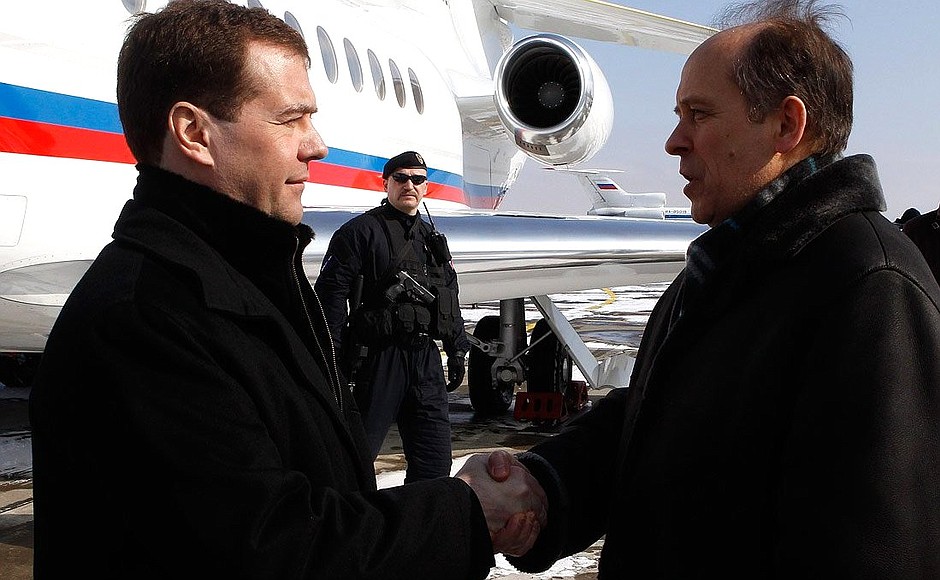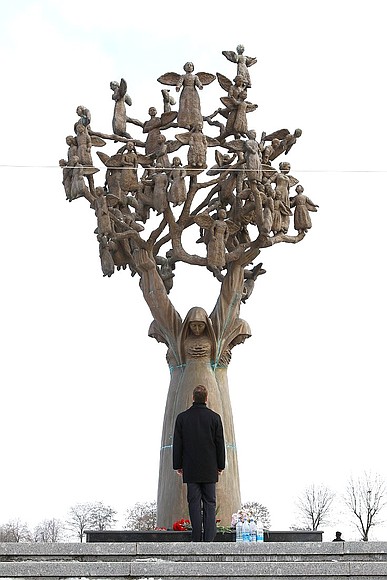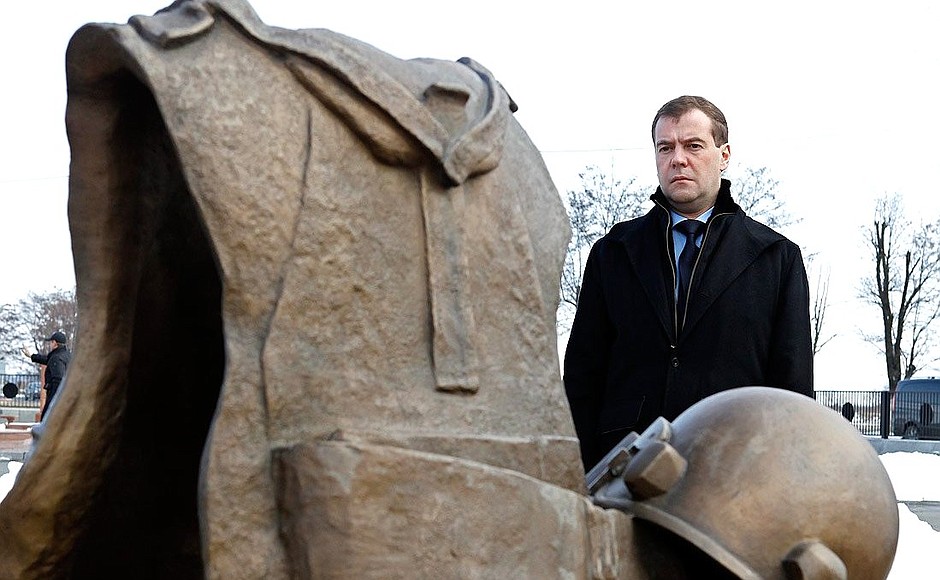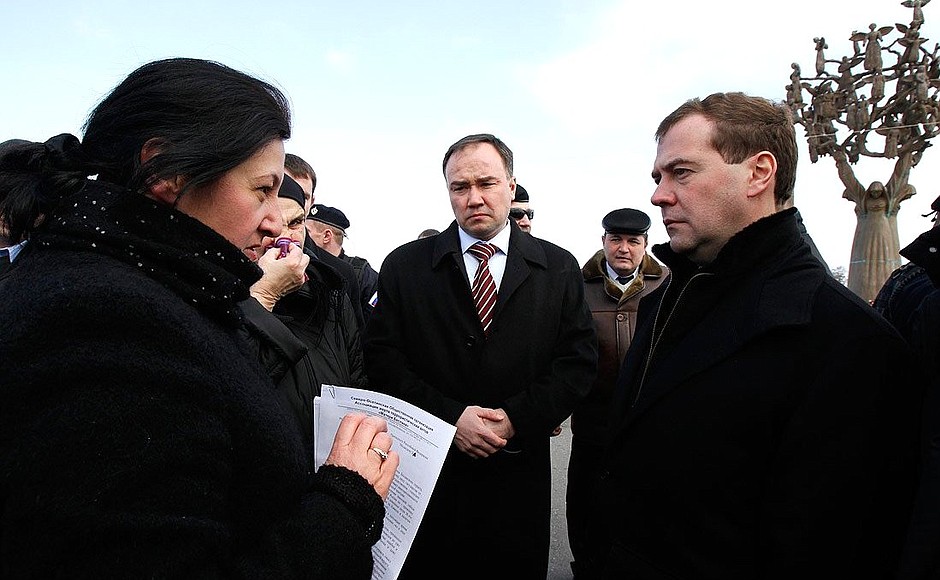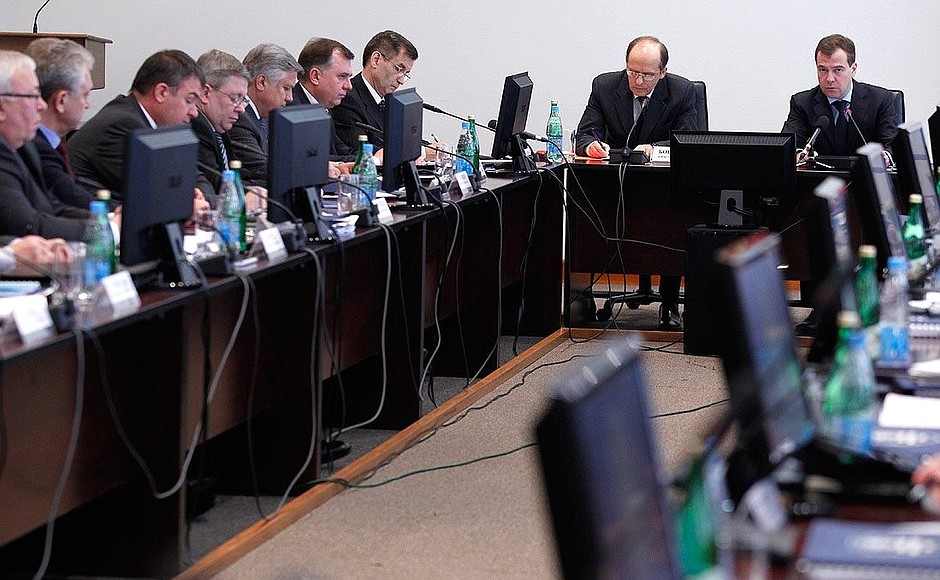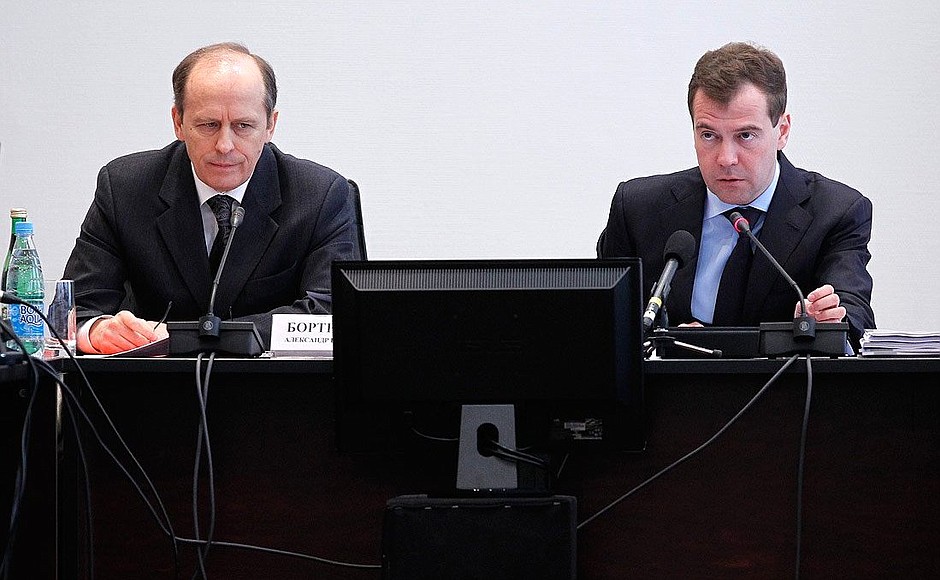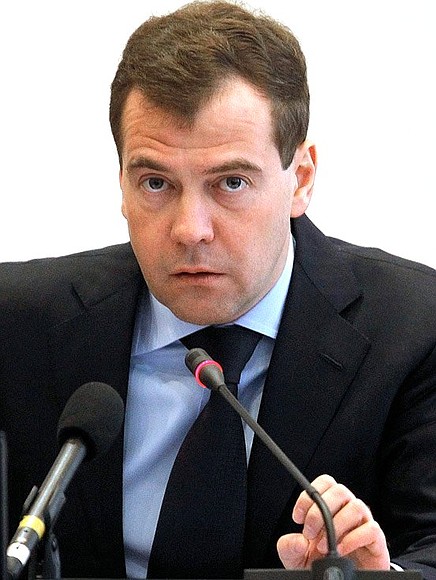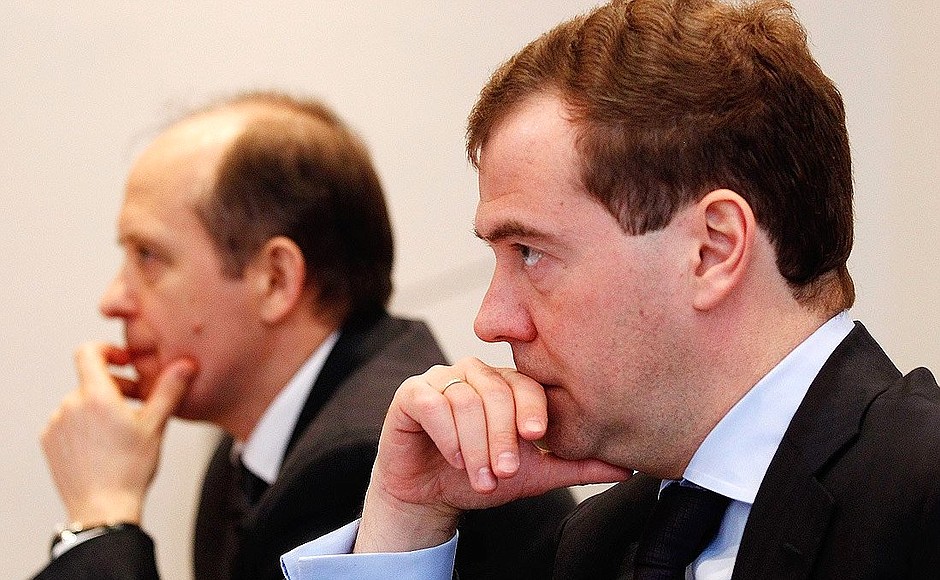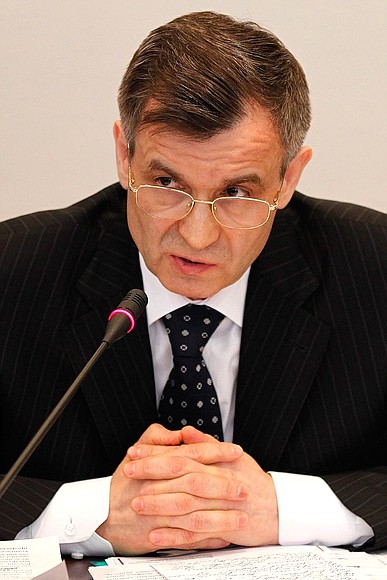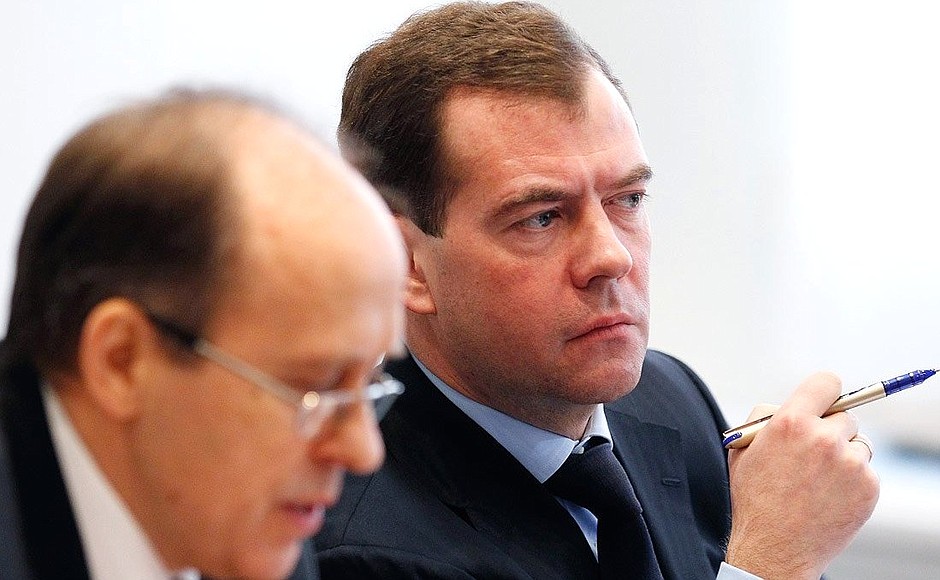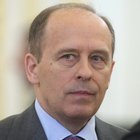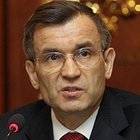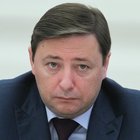Dmitry Medvedev also visited Beslan, where he laid a wreath to the Tree of Grief, a memorial to the victims of the 2004 terrorist attack. The President paid tribute to officers of the special forces who died liberating hostages.
* * *
Excerpts from transcript of National Anti-Terrorism Committee meeting
President of Russia Dmitry Medvedev: Good afternoon, colleagues,
Today's meeting of the National Antiterrorism Committee is being held in the North Caucasus, in Vladikavkaz, rather than in Moscow. This is the first National Antiterrorism Committee meeting chaired by the President of the Russian Federation. I have decided to hold this meeting here in North Ossetia. Why? I am sure all of you know the answer to this question.
It is here that our citizens are faced with terror almost on a daily basis. Terror exists in other parts of our country too, but in the North Caucasus it is present almost everywhere, and terrorist attacks occur quite regularly, unfortunately. The root of contradictions that generate extremism and radicalism is here.
It is not the first event to be held in the North Caucasus. Today I would like to review what we spoke about almost a year ago, on April 1, 2010. I held a meeting on counterterrorism in Daghestan, and in the course of the meeting I outlined five areas for combating the worst evil of the 21st century, at least in the context of our situation and taking into account our concerns. Today I propose that we analyse what has been done since then in each of these areas.
First. I talked about strengthening the law enforcement and security component in the North Caucasus, which applies to our main agencies – the Interior Ministry, the Federal Security Service and other security agencies – as well as the protection of judges. On the whole, the decisions that were necessary to optimise the resources of these agencies in the North Caucasus Federal District have been adopted.
Despite the fact that in some cases (as in the case of the Interior Ministry, for example) overall efforts are being aimed at cutting personnel, this measure does not apply to the North Caucasus in line with my decision. On the contrary, in many situations we have increased the number of military personnel and established specialised units in several North Caucasus republics.
”The terrorist attacks last year and this year indicate that our country still has many problems with security. We must not relax, just as there can be no simple prescription.“
Measures to protect judges are also being implemented, although this process is not without its problems. We have adopted laws aimed at ensuring quality independent legal proceedings in terrorism cases, in order to exclude coercion or intimidation of judges and jurors. But this is only the beginning and our efforts must continue.
The second issue I discussed a year ago is strikes against terrorists. Active efforts were made in this area during the whole of the past year. 332 militants were killed, of whom over 40 were ringleaders of gangs. More than 600 gang members, including both the perpetrators and their accomplices, were arrested and will go on trial. Federal Security Service Director and other heads of law enforcement agencies will give us more detailed information about this.
Our colleagues from the Interior Ministry, the Federal Security Service and other agencies acted heroically on a number of occasions, giving their lives to rescue people and destroy the militants. A large number of our comrades were killed. In 2010, this figure is 268 officers of law enforcement and security agencies.
I instruct the Interior Ministry and the Federal Security Service to prepare further proposals on the support to the families of the fallen officers, provide them with assistance, housing and cover their education expenses. This work is already underway but given the fact that the terrorist threat persists, further action is required.
At the same time strikes against terrorists, the destruction of those who refuse to surrender must continue. We are not talking only about retaliation strikes against terrorists. Of course, the terrorists must be brought to justice, and if they resist, then do not hesitate to destroy them ruthlessly.
These degenerates have no pity for women or children, and we must not show mercy for them. I emphasise, however, that we are not just talking about retaliation. We must also conduct preventive action, as it is done in many other states, that is, attack them in their lairs, in their dens, in their hiding places, wherever they are. These efforts must be brought to an end and they cannot be interrupted.
”The socioeconomic development programmes are being implemented at different speed but I cannot say that the situation is at a standstill. We must continue to develop these projects and to initiate new ones, including large-scale projects. Whatever the bandits try to do, we will continue working on such large projects, including the development of an alpine tourism cluster in the North Caucasus. Everything must be restored and the efforts must continue.“
The third area I talked about is helping those who have broken off from the militants. I expect to receive more detailed information from regional governors: what has been done, how many people have left the militants’ ranks, how is their social adaptation proceeding, have they found jobs or enrolled in schools. Here, much depends on the implementation of socioeconomic programmes, and this is the direct responsibility of the Government of the Russian Federation and the regional heads in the North Caucasus Federal District. I want to hear your report on what has been achieved.
The fourth issue we discussed last year was the development of socioeconomic infrastructure of the North Caucasus republics. I must say that everyone has been involved in this effort. In the intervening period, I visited all the republics in the region, as well as the Stavropol Territory, which is part of the North Caucasus Federal District. The socioeconomic development programmes are being implemented at different speed but I cannot say that the situation is at a standstill. It is not, progress is evident, both federal and regional programmes are being initiated, new production facilities are established everywhere, which had not been the case for a long time, new jobs are being created, the situation in Daghestan is improving, which is encouraging, and new economic projects have been launched.
We must continue to develop these projects and to initiate new ones, including large-scale projects. Whatever the bandits try to do, we will continue working on such large projects, including the development of an alpine tourism cluster in the North Caucasus. Everything must be restored and the efforts must continue.
Only the creation of new jobs can bring hope to young people, who have no jobs and who are first recruited and then brainwashed by the extremists. The fight against unemployment, job creation, educational programmes, tours of cultural institutions in the North Caucasus, tours of various performance artists – all of this is very important. People who live in the North Caucasus live in Russia and must feel like its full-fledged citizens.
Fifth, the strengthening of moral and spiritual values. In fact, this issue can be moved up to the forefront. Assistance to religious leaders is an extremely important topic. We are talking about the spiritual realm, and this is the most complex, most delicate area.
For centuries, Islam has developed in Russia as one of our traditional religions, but the injections of extremism and radical movements have appeared only recently and they are extremely dangerous. It is not for state officials to deal with this or, in any case, not only for state officials. This, above all, is a job for the clergy, because this problem exists throughout the Muslim world.
Muslim clerics, imams and muftis often behave like heroes. Yesterday I presented state awards to relatives of the clerics who had been killed. Their lives are an example of service to the Motherland, the Russian Federation, and an example of service to their faith, to Islam. They are the true martyrs for their faith, and not those bastards who blow up children.
”We must also conduct preventive action, as it is done in many other states, that is, attack them in their lairs, in their dens, in their hiding places, wherever they are. These efforts must be brought to an end and they cannot be interrupted.“
Finally, the terrorist attacks last year and this year indicate that our country still has many problems with security. We must not relax, just as there can be no simple prescription like the ones we sometimes hear from the media and from some analysts, both homegrown and foreign. There is no universal or quick formula, no one in the world has come up with it and we will not be able to either.
Look at the current situation in the Middle East and the Arab world. It is extremely difficult and great problems still lie ahead. In some cases it may even come to the disintegration of large, heavily populated states, their break-up into smaller fragments. The character of these states if far from straightforward. It may come to very complex events, including the arrival of fanatics into power. This will mean decades of fires and further spread of extremism.
We must face the truth. In the past such a scenario was harboured for us, and now attempts to implement it are even more likely. In any case, this plot will not work. But everything that happens there will have a direct impact on our domestic situation in the long term, as long as decades.
Let's be honest and not deceive ourselves or the people: this is a big and complicated problem, and we will have to make extensive efforts to tackle it over a prolonged period of time. But the conclusion is obvious: no one but us can restore order in this sphere.
Common approaches are equally clear: regional development, comprehensive development of the North Caucasus regions, social programmes, job creation, ongoing efforts to create jobs, to develop educational programmes, to support education and, finally, to provide comprehensive support for Russian Islam.
Those who are willing to change should get a chance. Those who want blood will choke on their own blood. There can be no other approach here or in other countries. Even those who criticised us harshly ten years ago have come to realise that. Once again, to conclude, I would like to say this: this is our country and our land, and it is our responsibility to restore order – for all of us and, above all, for our children. And we will restore it.
* * *
”The fight against unemployment, job creation, educational programmes, tours of cultural institutions in the North Caucasus, tours of various performance artists – all of this is very important. People who live in the North Caucasus live in Russia and must feel like its full-fledged citizens.“
As we planned, the first item on the meeting’s agenda today was analysis of the circumstances surrounding the terrorist attack at Domodedovo Airport. But in my remarks I deliberately focused my attention on another issue, because rather than responding only after the event, we need to take preventive action.
Of course we must make as thorough an analysis as possible into the circumstances of what happened. We are doing this, and I hope this work will be completed. We have already made some overall conclusions now. The people directly responsible for organising this attack have been punished. But this does not mean that other decisions will not follow once the investigation has been completed. The investigation is being carried out by the Investigative Committee, and its head will say a few words on this subject later.
I remind the Government members present, and the regional heads, that you cannot just wait until events happen before dredging to the surface the weak links in the chain and sorting out the problems. We need to anticipate events. What has been said regarding the transport sector therefore also applies fully to other public places. It is with this in mind that the Government has finally approved the regulation on standards and technical means for ensuring antiterrorist protection at such sites. This should have been done earlier. The regulation has been approved and now must be implemented.
This covers new sites and also equipping the existing ones, which make up the bulk of public facilities, that is to say, upgrading protection at existing public facilities. Budget plans will need to be made for funding the needed technical work, and the law enforcement agencies and private security companies will also need to plan for personnel, funds, and equipment in this area. The private security companies are in need of improvement, and we must raise their standards, but the state cannot get by without them. We must ensure that they work together effectively with the Interior Ministry and other organisations, and not just ‘sleep’ at the entrance to whichever sites. These private companies help in ensuring security all around the world, and it is simply not possible to post a police officer before every building in any case. As I said, the Government and the regional heads must pay particular attention to security at public places.
Another issue. To give those responsible for security a wakeup call, I visited a railway station [Kievsky Railway Station] and an airport [Vnukovo]. You know the results, and I have already given instructions. I am absolutely certain that there is work to do at transport infrastructure sites all around the country, and so I ask all of the regional heads here, and not just those in the North Caucasus Federal District, to make regular inspections of this kind.
You need to visit these sites yourselves, come in person, so that those responsible for security realise that you are keeping watch on things. This is the only way. This is the only way to teach our people not to be indifferent to security. Unfortunately, people’s instincts seemed dulled in this sense, and public vigilance here is not as high as it is in other countries that face terrorist threats. Everything that the FSB Director [Alexander Bortnikov] and Interior Minister [Rashid Nurgaliyev] said therefore applies not just to the transport system but to all complex sites, and this is the position you all need to base your work on.
* * *
”Assistance to religious leaders is an extremely important topic. We are talking about the spiritual realm, and this is the most complex, most delicate area. For centuries, Islam has developed in Russia as one of our traditional religions, but the injections of extremism and radical movements have appeared only recently and they are extremely dangerous.“
The bandits choose the ‘best’ sites for showing who is in charge. That is their whole logic. This is why they blow things up in Moscow. This does not mean that there is something wrong with our investment policies. We are moving in the right direction. This infuriates them and they are thus trying to spoil everything. This is their reaction to our policies.
As for the fact that not everyone understands what is going on, this is only natural, because people are people and have their own emotional perceptions. Frankly, the definitions you quoted all have the right to exist, sad as it may be, even the one that included a foreign component.
I will not name any countries, but a number of countries – countries with which we even have friendly relations – are nonetheless involved in the terrorism that we see in the Caucasus. The fact that people see this is not a misconception, but is rather one of the various facets of the real situation that we face today.
* * *
We need to bolster state authority and that of the law enforcement agencies. There is no alternative here. The regional heads need to sort out the situation in their respective regions.
Regional leaders who no longer have the public’s confidence need to go. This is a normal process. We cannot allow anarchy, but at the same time, we must listen to what the public is saying. Mr Khloponin, you need to keep watch on this, because you are not just a deputy prime minister, but are also the plenipotentiary presidential envoy [to the North Caucasus Federal District].
As for court cases, this is a legal matter of course, but these cases need to go ahead and be completed. If there are any obstacles not of a legal nature preventing their completion, they must be removed. Report to me separately on the issue here.
* * *
”Working with religious believers, this is a very important area of work, and perhaps Daghestan, as the most multi-ethnic republic, would be a good place to try out these methods in practice. How should we go about this? We need to be in contact with all of the different groups of believers, with those who do not agree too. We need to work with these people too, work with those who hold different views.“
Turning to the regional heads and plenipotentiary presidential envoys, as you know, the situation is far from straightforward in the country right now. When things happen, it is not the president who should have to come looking for the presidential envoy or the regional head and say “take action”.
You are responsible adults and you should be quick to get to the spot yourselves and see what is going on. Whoever does not get this is obviously not the best candidate for the job. So, if something happens, even if you have other plans, you need to brief the relevant official, in this case, the plenipotentiary presidential envoy, say, and after this, go out to the site. I hope you all understand this.
A second issue: regarding the damage [caused by the blast of a cableway in one of Kabardino-Balkaria’s ski resorts], I hope this will be repaired as soon as possible so that the scum who carried this out have no chance to be gleeful. And you need to deal too with the criminal elements that graft themselves on to these places. You need to get to the bottom of exactly what happened there.
Was it a case of terrorism, sabotage, or simply criminal feuds of some kind? At the moment, any criminal act can masquerade as terrorism, but in many cases there is actually no terrorism involved, rather, it is just criminal settling of scores, and so you need to sort out what’s what and make your reports.
As for the other incidents in the republic [Kabardino-Balkaria], all of the circumstances must be thoroughly analysed, the crimes investigated, and the counterterrorist operation completed. You need to identify those who had a part in killing our citizens, and punish them.
”You need to set up your sites and be present in these networks, set up religious sites too, give Islamic preachers the chance to speak there, give all interested people, not just Muslims, the chance.“
Finally, regarding the proposals aimed at improvements, I instruct the Director of the FSB and the Interior Minister to analyse these proposals and present a report to me. We held a meeting on this subject in Daghestan last April. Terrorist attacks have been committed there too recently, but at the same time, work is also underway to improve the overall situation.
* * *
On the subject of working with religious believers, this is a very important area of work, and perhaps Daghestan, as the most multi-ethnic republic, would be a good place to try out these methods in practice. How should we go about this? We need to be in contact with all of the different groups of believers, with those who do not agree too. We need to work with these people too, work with those who hold different views.
They become criminals when they take up arms or act as accomplices to those who commit crimes. But until this moment they are without question ordinary Russian citizens. This is a very thin line though, and if you succeed in putting these methods into practice it would certainly be very useful for improving the situation in Daghestan and in the North Caucasus in general.
There are many possibilities for working with these people and with all people who take an active part in various discussions. You know that these technologies are sometimes used for good, to unite people, and sometimes for evil. But this does not mean that we should follow the example of some countries and block the internet, cut off global communication channels and try to negotiate with one’s own people using armed force. This is more than just a dead-end road – it’s a crime.
We need to learn how to work in this environment. This is not always easy. You can encounter rudeness and insults there, not to mention outright calls to extremism. But we need to be present there nonetheless. You need to set up your sites and be present in these networks, set up religious sites too, give Islamic preachers the chance to speak there, give all interested people, not just Muslims, the chance.
This is delicate work that calls for a very fine touch, but there is no one who can do it better than you, the regional heads. This kind of work cannot be organised from Moscow. We can help, create the conditions, making some funding available, but most of this work will be on your shoulders.
Another subject raised today was that of the court cases in Kabardino-Balkaria and other places. I want the Presidential Executive Office and representatives of the law enforcement agencies to examine together with the legal community the issue of additional measures to ensure that court proceedings do take place, including perhaps by using more effective models for holding court hearings outside the regions where the crimes were committed. Look too into the possibilities for holding people accused of crimes in custody outside the region where the crimes were committed, in order to prevent them from trying to influence the course of justice, including through influencing jurors, witnesses, and victims, and also so as to prevent any other criminal attempts.
I think that in the situation we have the complete right to allow ourselves to step away from even the criminal procedural laws’ usual provisions. We should stop looking at these provisions as a sacred cow. If they are creating problems and stopping us from dispensing justice effectively, we need to take the steps needed to adapt them to the current circumstances in our country. People will understand this. This does not run counter to the fundamental values cemented in our Constitution. I hope the representatives of the Federal Assembly will support me in this.
”Look at the current situation in the Middle East and the Arab world. It is extremely difficult. In some cases it may even come to the disintegration of large, heavily populated states. It may come to very complex events, including the arrival of fanatics into power. This will mean decades of fires and further spread of extremism.“
One more issue to which I draw your attention is that it is essential that work in the North Caucasus District not boil down to just meetings with the President and other top national officials and the related events. This goes for everyone, and not just the presidential envoy, deputy prime minister, or regional heads. You all have to come here regularly. I know that many of you do come. But do not forget that this is a region that needs special attention.
Draw up a timetable, – I am also addressing here the general civilian part of the Government, — who will come, when, and where they will go. We need to get to work on this, otherwise our efforts will lack consolidation. By the way, it would be very useful too if governors from other regions and the presidential envoys to other districts also came and shared their experience in organising work. The current plenipotentiary presidential envoy in the region used to run a big and successfully developing region. I am sure that this will help to sort out the problems on the ground now. But others have experience to share too. So, come to visit, help, organise programmes together. This is all vital work.
<…>
